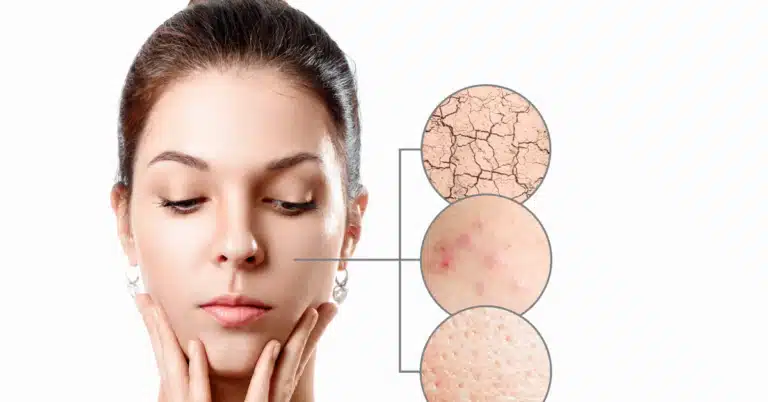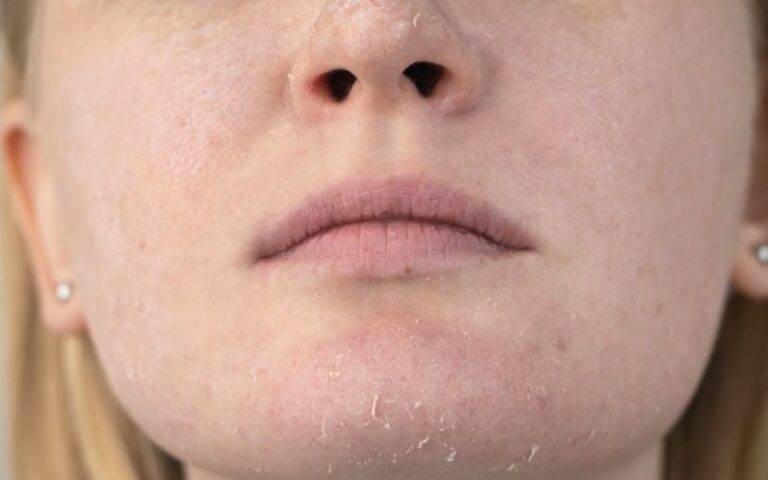Dry, Flaky Skin On Face: It’s Time To Moisturize

Although it is more common in winter, dry, flaky skin can occur anytime. If you’re suffering from dry, flaky skin, you can do a few things to restore moisture and achieve softer, more supple skin. You can take several simple steps to add moisture to your skin and achieve a healthier, more youthful appearance.
Dry, Flaky Skin On Face: What Is It?
When your skin’s surface sustains unintentional harm, it loses its top layer, leading to flaky or peeling skin development. Generally, the water content in healthy skin should be about 10% to 20%.
When the skin’s natural oils start to dwindle and dry up, it develops flaky skin, which causes the skin to become dehydrated. Due to this, the skin’s outermost layer crumbles and peels away because dry skin loses water 75 times faster than regular skin.
Dry, Flaky Skin On Face: Common Causes
Dry, flaky skin can develop for a variety of reasons. It can be particularly troublesome when it occurs on your face. Some common everyday elements could be the culprit if your skin feels dry with flaking and itching.
Skincare Products
Generally, skincare products are made to rip off the oil in your skin. The harsh ingredients can also strip out all the moisture from the skin, making it feel drier.
Some alcohol-based treatments also tend to strip your skin of its natural oils and cause irritation or increased dehydration, like as astringents or harsh toners. It also applies to items with strong fragrances, antiperspirant soaps, foamy and soapy cleansers, perfumed soaps, and other items made with drying alcohol components.
Applying skincare products in an incorrect order can dehydrate your skin and make it drier. Hence, the key to locking the moisture is to layering the products – cleaners, moisturizing serum, and cream to restore essential oils and fats to the skin.
Extrinsic Factors
Your face may get drier if there is a change in the temperature or humidity levels. It can be seasonal, and this usually occurs during the winter season. A general lack of moisture in the air can impact your skin’s look. Fortunately, these cyclical dry spells are typically brief and don’t need to worry about.
Long, hot showers or baths are yet another potential external cause of dry, flaky skin. Taking long hot showers or soaking yourself in a hot bath can also cause your skin to dry and flake since such practices can deplete natural oils from the skin.
Pre-Existing/Other Skin Conditions
People with chronic skin disorders like eczema and psoriasis frequently experience itchy and dry skin as one of their skin problems. The typical symptoms in these conditions are itchy, raised, red, or thick flakes, which can sometimes seem crusty. You must seek emergency medical assistance if you have unusual plaquing or dryness on your face or body.
Remember, conditions such as hypothyroidism and diabetes also cause dry skin.
You may use moisturizers made with ceramides aids in restoring the skin’s natural protective barrier because those who encounter these skin disorders may have a weakened skin barrier.
Vitamin deficiency (lack of vitamin A, vitamin D, niacin, zinc, or iron) also contributes to dry skin.
Medications
Certain prescription medications, such as statins and diuretics, can cause side effects, one of which is dry and flaky skin. In that case, consult your medical provider for the finest, most individualized treatment choices if you suspect that the side effects of your medication may be causing you to develop signs of dry skin.
Dry, Flaky Skin On Face
One of the finest treatment methods for dry, flaky skin is moisturizing. Moisturizing helps seal the water content in the skin, rejuvenate the skin cells in the top dermal layers and prevent future dryness.
Fortunately, there are many ingredients in our household that you can use to moisturize your skin.
- Coconut Oil: The saturated fatty acids can help hydrate and smoothen your skin. Coconut oil can be utilized daily, even on the most sensitive parts of your body, including the eyes, nose, and mouth.
- Sunflower Seed Oil: It improves skin hydration.
- Petroleum Jelly: You can apply this jelly if you have dry, flaky skin. It will form a protective layer and trap moisture beneath the skin.
- Honey: The anti-inflammatory, moisturizing, and healing properties help relieve dry skin by penetrating the deeper layers. It’s a good hydrating agent and can be applied directly to your skin.
- Aloe Vera: It contains vitamins A and E, and the anti-inflammatory properties provide a soothing effect for dry skin irritation.
- Oatmeal Extract: The anti-inflammatory and antioxidant properties can help treat dry, flaky skin.
Over-The-Counter Products
- Humectants: The elements present in humectants aid in sealing moisture. Some humectants include ceramides, glycerin, sorbitol, hyaluronic acid, and lecithin.
- Occlusives: Substances such as silicone, lanolin, petrolatum (petroleum jelly), and other oils help seal moisture in the skin.
- Emollients: Various substances have a soothing and moisturizing effect when applied to the skin.
Benefits Of Adding Moisturizers
Adding moisturizers to our skincare routines can be an added benefit in maintaining healthy-looking skin. Benefits include:
- Prevent Dryness: Your skin can significantly impact temperature and humidity level changes. A good moisturizer will replenish lost moisture and help prevent further moisture loss.
- Reduce Aging Symptoms: A well-hydrated skin will have a youthful appearance. Hydration or moisturization helps in slowing down the aging process. Every error we make in our skincare routine can give us an older appearance.
- Help Fight Against Acne: Dry skin signals your glands to generate extra oil that clogs your pores and results in breakouts. Therefore, keeping skin well moisturized can help regulate sebum production.
- Calm Skin Inflammation: Certain moisturizers containing elements such as aloe vera, chamomile, oatmeal, and honey can help relieve skin inflammation.
Best Moisturizer Ingredients
The majority of cream-based moisturizers for dry skin have a thicker viscosity. You can choose whether or not to avoid fragrances or use only natural ingredients. The most crucial factor is the product’s effectiveness with a well-balanced formulation that addresses your unique skin conditions.
Consider purchasing items with the hydrating components and select a moisturizer that has at least some of the components listed below:
- Ceramides
- Glycerin
- Hyaluronic Acid
- Urea
- Aquaporins
- Antioxidants
- Plant butter and oils
- Calendula flower Extract
- Shea Butter
- Cocoa Butter
- Avocado Oil
- Grape Seed Oil
Dry, Flaky Skin On Face: Prevention
Dry, flaky skin can be irritating. Individuals with dry skin tend to produce less sebum (natural oils) than others with normal, combination, or oily skin. Hence, taking preventive measures for your skin to be healthy is significant.
After showering, applying emollients and moisturizers to your face helps prevent dry skin. As a preventive measure, you must avoid certain things, including:
- Over-cleansing with abrasive cleansers or soaps
- Shaving without shaving gel or with a dull razor
- Overuse of air conditioner
- Picking at your skin
- Excessive sun exposure or neglecting the use of sunscreen
- Utilizing alcohol-containing lotions
- Towel drying skin too vigorously
- Washing multiple times a day
- Wearing clothing that causes skin rubbing
- Regular exposure to detergents
- Sitting next to a heater or fire while it is hot
- Being uncovered while outside in windy situations
- Reactive chemical peels and exfoliators
- Highly scented skincare items that include drying alcohols
- Harsh astringents or toners
You can try any natural ingredients suggested above to treat flaky skin, regardless of the cause. Despite the numerous factors contributing to dry skin on the face, a dermatologist can assist by advising hydrating treatments, which are fragrance-free, non-comedogenic, and non-drying.
FAQs
Q: How often should you wash your dry, flaky skin?
A: If you have dry skin, wash it only once a day. Also, stay away from harsh chemicals and soaps.
Q: When to consult a doctor for dry skin?
A: If you have tried all the possible remedies and still experience the same dryness with irritation and pain, consult your doctor. They can help you soothe dry skin with proper treatments and suggestions.
Reference
- Dry Skin on the Face: https://www.healthline.com/health/beauty-skin-care/skin-care
- Do You Have Dry, Flaky Skin: https://share.upmc.com/2018/04/dry-flaky-skin-on-face/
- Home Remedies: https://www.medicalnewstoday.com/articles/319555
- Common Causes: https://www.cerave.com/skin-smarts/skincare-tips-advice/4-common-causes-of-dry-flaky-skin-on-your-face
- Dry Skin: https://www.webmd.com/skin-problems-and-treatments/dry-skin
- Moisturizers for Dry Skin: https://www.healthline.com/health/moisturizer-for-dry-skin
- Dermatologists’ Top Tips For Relieving Dry Skin: https://www.aad.org/public/everyday-care/skin-care-basics/dry/dermatologists-tips-relieve-dry-skin
- Mistakes That Are Making Your Skin Super Dry: https://www.self.com/story/how-to-treat-dry-skin





